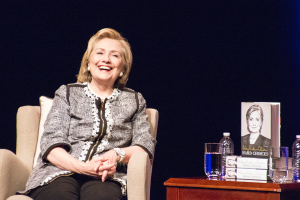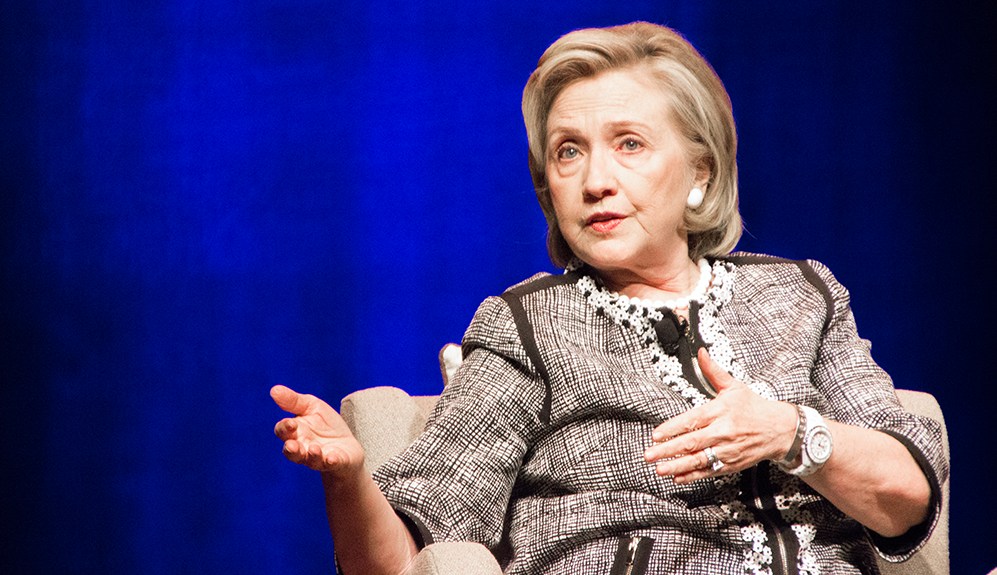
Clinton discussed her tenure at the State Department in a conversation at GWU’s Lisner Auditorium.
Former Secretary of State Hillary Clinton discussed her new book, “Hard Choices,” at The George Washington University’s Lisner Auditorium, which sponsored the event in partnership with Politics and Prose bookstore as part of “The Newsmakers Series” on Friday.
“I think we have to ask ourselves what it means today to be an American in the 21st century and what we expect from each other, what we expect from our government,” Clinton said. “I am optimistic and confident about what our potential is but I know we have some hard choices to make to try to realize that.”
The series aims to move beyond the headlines to spark in-depth conversations about contemporary issues. The event sold out within hours of tickets becoming available. Clinton spoke in conversation with Politics and Prose co-owner Lissa Muscatine, a former White House speechwriter for then-First Lady Clinton and President Bill Clinton. She also helped Clinton write her White House memoir, “Living History,” and served as her senior advisor at the State Department.
Clinton began with noting that she did not care to mask her opinion and had decided to speak more freely than in the past.
“It just seemed a whole lot easier to just put it out there and hope people get used to it,” Clinton said. “Whether you agree with it or not, to know exactly where I’m coming from, what I think, what I feel, I really believe that’s missing in our government dialogue.”
Clinton affirmed that an honest conversation between two sides is something that the nation’s political sphere does not represent today.
“There’s so many big issues and I‘ve talked about them, both nationally and internationally, and I don’t think we gain by either shouting matches or finger pointing or biting one’s tongue,” Clinton said. “I think we need to have a very open, straightforward conversation.”
Despite a chapter over 30 pages on the 2012 terror attacks in Benghazi, Libya, Clinton and Muscatine avoided the topic, given the heated congressional debate and the House Select Committee investigation. Clinton chose to speak about the role of America more broadly in the world.
“I saw my role primarily to do all I could to restore American leadership and that meant several things to me,” Clinton said. “It certainly meant that I had to figure out how to deal with the emergencies and how to tend to what where a long range of complaints.”
One of these issues that the Obama Administration inherited in 2008 was the war in Iraq. Iraq has recently been in the news due to the advancement of militants from the Islamic State of Iraq and Syria and sectarian power struggle.
“The underlying problem here though is not one of military preparedness and security, although we have seen that neither is present in the current conflict in Iraq,” Clinton said. “The problem is the perception of leadership and government that Maliki brought to the prime ministership.”
The United States has struggled with whether to intervene and enable the Shiite government of Prime Minister Maliki to keep power or to make concessions to the Sunni minority, which has a long history of abuse and neglect.
“[Maliki] was often quick to attack, even investigate, charge with crimes, those who politically disagreed with him,” Clinton said. “As a result, the inclusive governing structure that reached out to the various elements — particularly the Sunnis in Iraq — to try to overcome very deeply felt historical differences but very necessary changes if there were to be stability in Iraq never happened.”
Clinton also spoke to what is most essential in solving conflicts and power struggles like this: building relationships.
“One of the virtues that I think we Americans need to cultivate is patience,” Clinton said. “Because so much of what still matters in the world is based on building relationships and looking for areas where you can establish some level of trust.”
Clinton gave an example of her herself taking time to form friendships with leaders around the world, a story she also describes in her book.
“I remember going into a meeting with the King of Saudi Arabia … in a huge meeting room, and I spent about 15 minutes talking with him and talking with the Foreign Minister Prince Saud al-Faisal about camels,” Clinton said. “I turned to the King and said, ‘Your Majesty, the Foreign Minister said he doesn’t like camels!’ and he said, ‘What is wrong with him!’”
Clinton described the effect that time and patience can have on forming important and substantial relationships.
“We then could get down to business because we had actually interacted as two people, not two officials in a hurry,” Clinton said. “And I try to make the point over and over in the book, you just have to invest more time and it takes patience and it takes people willing to do that, to build those relationships.”
Clinton concluded the event by answering a question about her legacy and whether her highly anticipated future includes a 2016 presidential campaign.
“I don’t think about a legacy, I think about my life because I’ve had quite an unpredictable life,” Clinton said. “I could never, when I was growing up in Park Ridge, Ill., have imagined what I have had the great pleasure of experiencing, the challenges and difficulties along with the extraordinary experiences and opportunities.”
Clinton did not give any indication that she would be slowing down anytime soon.
“I’m not ready to stop and think about legacy because I want to keep thinking about what my life has meant to me and what my obligations are to my grandchild and everyone else and I’m going to do that through the work at the Clinton Foundation and in other ways,” Clinton said, to a standing ovation from the audience.















